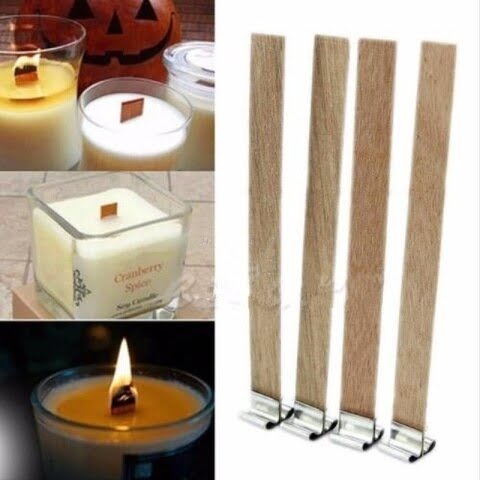Introduction
Soy candles are an excellent choice for home decor, as they are clean burning, low sooting and have a pleasant scent. Additionally, soy candles last longer than traditional wax candles, giving off a more intense aroma throughout the room. When making soy candles with dried herbs, you can expect a soothing and calming ambiance in the space.
The process for making soy candles with dried herbs is relatively straightforward. First, gather quality materials to ensure your project turns out perfecly. You will need: dried herbs of choice; quality purified or distilled water; natural soy wax flakes; fragrance oils (if desired); a thermometer; metal or wood stirring utensils; mason jars; wicks and glue dots to adhere them to the jar. The process involves mixing the wax flakes with the water and blending it until the temperature reaches around 175 degrees Fahrenheit before adding in your chosen herbs. Then add fragrance oil (optional) and pour it into glass jars and set the wick in place with hot glue dots as anchor points at either end of the jar rim.
Safety Tips
Before working on making soy candles, it is paramount to take certain safety precautions. First and foremost, be sure to wear protective clothing such as long-sleeved shirts, gloves and goggles. Additionally, you should work in a well-ventilated area and avoid direct contact with the melted wax as it can cause severe burns. Make sure that all equipment is unplugged and in safe condition when not being used during the process. Furthermore, keep children away from any of the supplies used for candle making as they may contain harmful ingredients. Finally, place a fire extinguisher nearby in case of emergencies or unexpected fires.
Planning Your Soy Candle
To make soy candles with dried herbs, you need the correct equipment, ingredients, and types of wax. The first step is to gather your needed equipment. You will need a double boiler or microwave-safe bowl for melting your wax, a container for your candle such as a mason jar or teacup for holding the melted wax and herbs, funnels for easily pouring melted wax into containers, thermometers for safety when heating the wax and gauging its temperatures, wicks with holders to insert in the candle jars and heat resistance gloves to protect yourself from any hot spills.
The next step is gathering your ingredients; these include different types of soy wax depending on what type of candle you want to make such as natural beeswax/soy blend or no-additive soy wax; essential oils if you want to scent your candle; dried herbs that add color and design such as lavender buds, rosemary leaves, chamomile flowers etc.; glitters or garnishes and lastly an accessorized glue dot or tabs to get your wicks speedy onto the bottom of your glass container.
Once you have collected all necessary materials, it’s time to choose the best type of soy wax for your needs. There are many different types such as Natural beeswax/soy blend which allows one to use natural beeswax in their creations while providing a better overall burn. No additive soy wax works perfectly for those who do not want any additives added at all. And finally botanical soy is perfect when making candles with dried herbs because provides excellent scent throw plus safe burning characteristics since it has low smoke point.
Preparing the Herb Mixture
Creating the perfect herb mixture for soy candles can be a tricky endeavor. One of the keys to success is blending the right balance of aroma-producing herbs and flowers, making sure that none of the elements overpowers any other. Start by sourcing quality dried herbs, flowers, and leaves from reputable vendors; using natural materials that have been grown without chemical pest controls or fertilizers will further enhance your finished candles’ aroma.
It’s essential to take into account the specific aromas associated with each ingredient when combining these items together into your home-crafted scent cocktail. Consider which notes you want to lead in your blend – do you prefer a bright, citrusy undertone with bolder herbal notes? Perhaps you like sweet florals backed up by an earthy base. Meanwhile, it’s wise to incorporate accent elements such as spices, herbs and resins as they create complexity as well as bolster and diffuse some of the primary elements in your mix. After measuring and combining all ingredients according to your recipe proportions carefully assemble them in a glass bowl or mortar before adding them directly into your wax melt cups or container candle molds.
With practice (and quite possibly an embarrassing number of tried concoctions) you can become a chemist-like master at crafting custom aromatic creations for soy candles that greatly surpass anything mass produced on store shelves ” timeless true fragrances unparalleled across centuries past!
Melting the Wax and Adding the Herbs
When melting down the soy wax, it is best to do it slowly over low heat in order to prevent any harsh reactions that can ruin the candle’s appearance and scent. You can use a double boiler or simply a pot on the stove. If using the latter option, be sure to not let the heat get too high as this could cause the wax to burn. As you start melting down the wax, make sure you are stirring occasionally until the wax completely melts into liquid form.
To add in your choice of herbs, start by grinding them up into smaller pieces for an easier time adding them into the melted soy wax. Make sure you take extra precaution when doing this ” watch out for hot droplets of soy wax that may splatter around as possible hazards. After grinding them up, put them aside and stir in some fragrance oils or essential oils of your choice before stirring in the herbs until they’re evenly spread out throughout. Then, carefully transfer your scented blend of herbs and soy wax into pre-prepared candle molds before letting it cool and harden!
Casting the Soy Candle
Making soy candles with dried herbs can be a fun and rewarding project. To ensure that the soy candle comes out perfectly-shaped, there are some steps that must be taken to guarantee success. The first step is to prepare the mold and wick for 3-6 hours prior to making the candle. Making sure the wick has been primed properly will help the wax adhere to the sides of the mold as it sets up. Additionally, using a good wick size according to the size and depth of the mold will affect how well the candle sets and burns.
The next step is melting the wax slowly and evenly over low-medium heat until it’s completely liquefied. Make sure all ingredients – such as dyes, fragrances, dried herbs, etc. – are added only after wax has proprely melted in order to avoid any clumps or issues with balance throughout your candle. As for adding dried herbs, make sure these are measured precisely to allow for even distribution of scent within your candles as they burn.
Once everything has been mixed together carefully, pour the soy mixture slowly into molds while rotating it around until you have achieved sufficient coverage on all sides. Tap each side gently using something like a spoon handle or pen in order to minimize any air bubbles within your candle before allowing it time to cool down without interference! Once cooled off, remove it carefully from its mold and trim off any overflowing wax before adding an extra fragrance or decorative element that compliments your end product!
Finishing the Soy Candle
The key to ensuring your soy candle is perfectly cured involves three separate techniques: curing the initial pour, adding additional wax, and trimming off the excess.
Curing the Initial Pour: After you’ve completed the first layer of your soy candle by adding herbs and wicks, it’s best practice to allow it to sit for 3-4 days before doing anything further with it. This allows time for the soy wax to further cool down and for all the layers of wax to settle in together and form a sturdy base.
Adding Additional Wax: Adding an additional layer of wax will also help your candle maintain its structure as time passes by. It’s important that you wait at least 48 hours after curing the initial pour before adding this layer and make sure it has fully cooled before doing so. This way all layers adhere properly together, making sure they don’t separate over time.
Trimming Off Excess: Finally, you should use a knife to trim off any excess or wonky looking areas of your candle, like rogue herbs or uneven ridges or scratches that may have appeared while creating or cooling down the candles. Trim gently but firmly around to ensure even edges around all sides of your finished product.
Enjoying the Soy Candle
Storing your soy candles with herbs inside is a great way to keep them looking their best and freshest. To do this, store the soy candle in an opaque, airtight container after each use. Keeping a candle stored in the dark will help reduce the discoloration of the candle wax that can occur from exposure to sunlight. You may also want to rotate through different containers for variety, as you never know how your guests will react when seeing your homemade creations!
To further enjoy the Soy Candle with Herbs, consider adding widths of ribbon laced between different herbs or around the sides. Different colored ribbons can liven up any room, or even better ” lavender ribbon! You could also tie strings of herbs together and hang them off of door knobs or other exciting parts of the home you are entertaining at. This allows aroma to continuously fill the house and excite guests throughout their stay with you. Additionally, large votive holders covered with lightly dried flowers make for a beautiful center piece for tables and coffee carts alike. Experimenting with different herb combinations can result in interesting smells that match décor and atmosphere perfectly!
Conclusion
Making soy candles with dried herbs is a great way to add natural, pleasant aromas to your home. Soy wax is an environmentally friendly material because it is made out of renewable sources such as vegetable and nut oils which minimizes its carbon footprint. Additionally, soy candles burn at a cooler temperature and last longer than traditional paraffin candles. Also, they do not produce any smoke or soot like paraffin candles do, allowing you to enjoy the scent without any of the mess. Furthermore, by adding dried herbs and essential oils to your soy candle you can create unique fragrances that evoke cozy and comforting feelings all while enjoying a natural product. Finally, making soy candles with dried herbs can be an enjoyable, time consuming activity that encourages mindfulness and reduces stress.

Welcome to my candle making blog! In this blog, I will be sharing my tips and tricks for making candles. I will also be sharing some of my favorite recipes.





